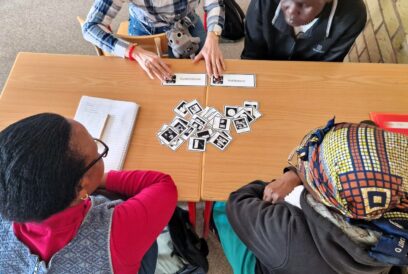

Self-help in the 2010s is primarily directed at women.
Self-help in the 2010s is primarily directed at women.
In order to fix the epidemic of anxiety and disconnection among young women in today’s society, self-help literature has boomed. The books make promises of a better life – but on whose terms? What kind of life lessons can be learned from the pages of self-help books?
According to the British National Health Service, young women are a high-risk group for mental illness, suffering from depression, anxiety and burnouts. Research has shown such a clear increase that concepts like ‘epidemic’ and ‘generation burnout’ have been used to describe the phenomenon.
Why are young women facing this exhaustion?
One way of explaining the phenomenon is that sexuality, appearance, bodies and capabilities of young women are constant topics of public discussion.
To put this in more academic terms, researchers argue that the narratives of self-surveillance are the lenses through which the female agency is controlled and monitored. This creates enormous pressures and stiff normative ground, especially for young women.
Another possible answer to this question is that women face heavy expectations to succeed in all aspects of life, and these demands create feelings of disconnection and loneliness.
Women are persistently told that they are not doing enough. The exhaustion, then, is a result of being in the crossfire of multiple demands.
Managing exhaustion with self-help
Now, the culture of enormous expectations and the resultant exhaustion is leaving women trying to find solutions. Nevertheless, a study by the EU Health Programme found that mental health services are not always easily accessible, and many women must manage on their own.
To answer this call, a growing body of self-help literature has started to address these needs. The books make promises of a better life – but on whose terms?
“The authors of self-help books have the power to articulate what it means to be a good woman and what to do to be just that,” says Sarah Riley, Reader at University of Aberystwyth, who has researched the genderised nature of self-help literature.
“The reoccurring message seems to be that women are inherently flawed and need to ‘fix themselves’. This is a dangerous message for people who are already exhausted by our performance-oriented societies.”
Centuries of ideological self-help
Despite the boom, according to Suvi Salmenniemi, a Finnish professor of sociology, self-help is by no means a new phenomenon.
“It has long roots in the history of positive psychology and the first book in the field, written by Samuel Smiles, was published as early as 1859.”
Salmenniemi’s research on therapy culture and self-help has shown that the ideologies that curate the books have not changed completely.
Post-feminism portrays women as liable, when they are not able to acquire equal salary, leadership positions and face sexism.
“Unlike the literature in the 19th century, self-help in the 2010s is primarily directed at women. The nature and the target groups of the books have changed over the years, but they still mediate similar individualistic ideologies, which were represented in the early work,” she explains.
The entanglement of gender and self-help literature dates back to the 1990s and the rise of ‘post-feminism’. The core idea of post-feminism is the presumption that gender equality has already been accomplished and now the primary quest for women is to ‘enjoy themselves’.
According to Salmenniemi, what this does is overlook the structural barriers that still restrict women’s freedom of agency.
“By disregarding the societal obstacles, post-feminism portrays women as liable, when they are not able to acquire equal salary, leadership positions and still face sexism in their daily lives,” she says.
Developing feminist ways to attain traditional goals?
Self-help’s ways to empower people often seem rather feminist, but the life goals it presents are very traditional and heteronormative.
“How to find a man, how to attract a man and how to ultimately keep him,” Salmenniemi explains.
The literature also offers a performance-oriented way to escape anxiety.
“The ideal woman invests in her appearance, does yoga and takes tender care of her home and partner, all the while working hard in a leadership position. This sounds exhausting!”
The oppressing structures are not likely to change by merely ‘improving the self’.
Salmenniemi says that self-help talks about female sexual liberation, but the narratives are concentrated on learning about men and their supposed needs. Women are portrayed as responsible not only for the betterment of themselves, but also for the well-being and sexual satisfaction of their partners.
The phenomenon of conceptualising and oversimplifying male preferences and teaching them to women has been described as ‘menology’.
“Self-help urges women to study ‘menology’ to become experts in pleasing their partners, which is often portrayed as their inherent responsibility and, if successful, accomplishment,” Suvi Salmenniemi explains.
Sarah Riley agrees. “This talk creates an asymmetrical representation of a relationship and adds more liabilities to it.”
Marginalised women are even more vulnerable to freedom discourse
Sarah Riley suggests that instead of finding solutions for becoming a good partner, losing weight, enhancing sex life or creating a more fulfilling life, we should ask a question: what are the real societal issues behind these issues?
“Not how to lose weight, but who wants me to lose weight? Whose sexual desires am I trying to meet? Who is the alleged expert behind this definition of a ‘fulfilling life’?,” suggests Riley.
She also says that however troubled the nature of self-help appears to all women, the problems are always starker to women within marginalised groups.
“These women are even more vulnerable when taking up individualistic discourses of freedom,” she says. The daily societal obstacles faced by disabled women, working-class women, LGBTI+ women and women of colour are even further beyond the individual.
The oppressing structures are not likely to change by merely ‘improving the self’, so the idea of self-attainable freedom might prove frustrating.
The representation in self-help is that the baseline is identical for all women. The literature overlooks the racist and ableist attitudes against marginalised women’s sexualities that make the baselines very different for all.
Solving problems by group healing and collective feminism
If self-help is such a narrow approach to female sexuality and offers even exhausting ways to develop the self, why do so many women read it?
Salmenniemi concludes that people are often trying to cope with very difficult situations in their lives and the criticism of self-help does not equal criticising the readers.
Her research shows that the ways of reading self-help are often very reflective.
“Women are critical readers and take statements with a pinch of salt.”
But understanding the phenomenon is critical: working on individualistic self-improvement is lonely work for women already at risk of feeling isolated. Both Salmenniemi and Riley suggest that the future needs collective feminism.
We need more inclusive and healthy approaches to womanhood, sex and sexuality.
“We need to recognise that a lot of these problems are shared by many women, and that they should not fall on the shoulders of individuals,” explains Riley.
Her approach suggests that collective action could show us that women are not in need of fixing – society is.
Salmenniemi would also make governments more responsible for sexual education offered to adults. She suggests that further ingraining sexual health education into public healthcare systems and training personnel could be a part of the solution.
“We need more inclusive and healthy approaches to womanhood, sex and sexuality. Ones that do not burden women with contradictory expectations and responsibilities.”
Author







